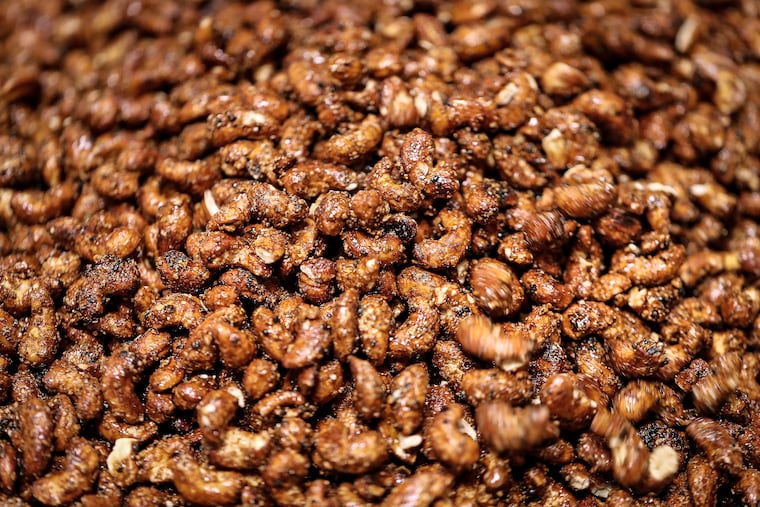Why Di Bruno Bros. started roasting its own black lava cashews
Sweet, salty and coated with a crunchy, candied texture, the nuts are addictive and flavorful. They’re advertised as the perfect accompaniment to a cheese or charcuterie board, but plenty of customers eat them solo by the handful.

When a small snack company in Northeast Philadelphia closed its doors at the end of last year, the owners of Di Bruno Bros. found themselves up against a tough deadline. For almost a decade, Society Hill Snacks had been manufacturing one of Di Bruno’s best-selling products: black lava cashews.
Sweet, salty, and coated with a crunchy, candied texture, the nuts are addictive and flavorful. They’re advertised as the perfect accompaniment to a cheese or charcuterie board, but plenty of customers eat them solo by the handful.
Society Hill Snacks announced in October that it would close at the end of 2018. It was right before the start of the holiday rush, which wasn’t good news for Di Bruno’s, which sells about 4,000 pounds of black lava cashews a year in stores, and more online.
“People come in and they buy two bags a week. In the Italian Market, they buy them by the quart," said Di Bruno vice president Emilio Mignucci. “We had to replace those sales, or figure out how to make them. It was a nightmare to think about.”
(Those bags, by the way, run about $12 each.)
They asked other companies, but nobody could quite replicate the formula. So after Society Hill Snacks closed in December after more than 40 years in business, rather than outsource the job to a big manufacturer, Di Bruno’s went into the nut-roasting business.
Di Bruno’s acquired the company formerly known as Society Hill Snacks, taking over its Frankford warehouse and snack recipes, as well as the 40-pound, 80-year-old copper kettles used for roasting the nuts over flames. Mignucci declined to comment on how much Di Bruno’s spent on the deal, but Di Bruno’s also took over the company’s remaining snack clients, and kept on the company’s five staff members.
It’s another sign that Di Bruno’s, which this summer opened a cafe in its Rittenhouse store, is looking to grow in new ways. Mignucci said he and his other co-owners see a move into manufacturing as an opportunity to increase sales of their Di Bruno’s-branded snacks and gift baskets. Already, they’ve used the facility to debut several new varieties, like cocoa-roasted almonds and a wasabi snack mix.
Before this year, Society Hill Snacks also manufactured products for Di Bruno’s that included cinnamon-spiced cocoa pecans and a smoked cheddar snack mix. But since Di Bruno’s started selling them in 2010, the black lava cashews have become one of the store’s most popular products.
Matt Belz, a longtime Di Bruno’s employee who ran the company’s wholesale and e-commerce divisions, stepped in to make them. A longtime Society Hill Snacks employee on the brink of retirement stayed on the job long enough to train him, and Belz spent days sweating over two kettles as they rotated like cement mixers over blue flames, learning the process and eventually training others.
The process is relatively simple, but takes work and time, about a half-hour per 30-pound batch. It starts with pouring water and sugar into the kettle to make simple syrup, then adding the cashews. After a few minutes, the mixture starts to coat the nuts and caramelize, creating a candied texture. As they start toasting, they must be kept moving with a paddle to keep them from burning. They’re finished with butter and the sea salt that gives the nuts flavor and crunch.
Belz experimented with roasting more at once, but quickly concluded that it had to stay a small operation. With more than 30 pounds of nuts at once, the heat didn’t distribute right, and the seasoning didn’t coat evenly. In the months and years to come, Di Bruno’s will have to invest in more kettles in order to expand, he said.
“We want the best product, and we’re very confident that this is superior," Belz said. “The only way we can grow is through the same process. Cutting corners wouldn’t work.”